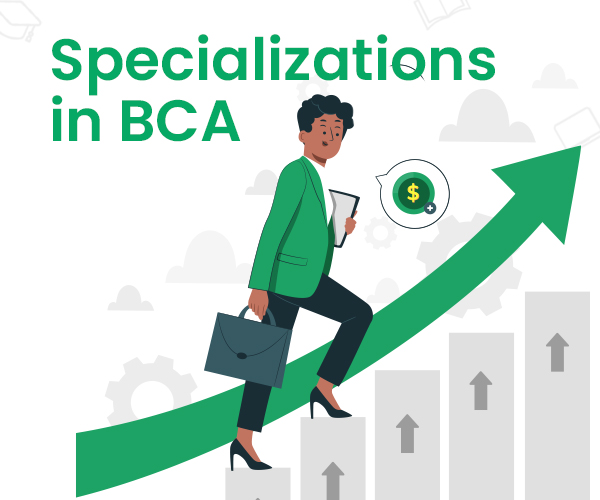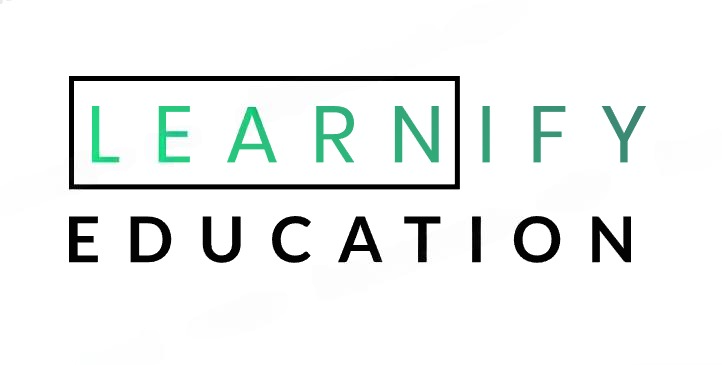Study Flexibility
Learn at your own speed and from anywhere.













The Bachelor of Computer Applications (BCA) is a three-year undergraduate program that provides a comprehensive education in computer applications, covering essential topics like programming languages, database management, web development, and networking. Designed to equip students with both theoretical and practical skills, the BCA program prepares graduates for various roles in the IT industry, making it an ideal choice for those looking to build a career in technology.
Study Flexibility
Learn at your own speed and from anywhere.
Affordable
Generally more cost-effective compared to traditional courses.
Resource Accessibility
Gain access to an extensive range of digital materials and interactive tools
Balanced Schedule
Perfect for professionals or individuals with hectic lives.
Equivalent Quality
Provides the same high-standard education and career prospects as in-person programs.

| Type of BCA Program | Description |
|---|---|
| Regular BCA | On-campus program with in-person classes. |
| Online BCA | Flexible program allowing study from any location. |
| Distance BCA | Correspondence-based with periodic exams. |
| Integrated BCA-MCA | Combined program spanning five years for BCA and MCA. |
| Specialized BCA Programs | Focuses on areas like Data Science, Cyber Security, AI. |


Core subjects in BCA lay the foundational knowledge necessary for a thorough understanding of computer applications and information technology. These subjects encompass a range of topics from fundamental principles to specialized areas, preparing students for diverse roles in the IT industry.

Computer Fundamentals
This subject introduces students to the basic concepts of computer systems, including hardware, software, and operating systems. Understanding these fundamentals is crucial as it forms the basis for more advanced studies in BCA.
Programming Languages
BCA students typically learn programming languages such as C, C++, Java, and Python. These languages are essential for software development, allowing students to write, test, and debug code to create applications and solve real-world problems.
Database Management:
In this subject, students learn about database systems, including data modeling, database design, querying with SQL (Structured Query Language), and database management techniques. Proficiency in database management is critical for handling large volumes of data efficiently and securely.
Web Technologies
BCA programs cover web technologies such as HTML, CSS, JavaScript, and web frameworks like React and Angular. These skills enable students to design and develop interactive websites and web applications, integrating front-end and back-end technologies.
Software Engineering
This subject focuses on the principles and practices of software development, including software design patterns, development methodologies (like Agile and Waterfall), and project management.
Operating Systems
BCA students study operating systems (OS) to understand how computer hardware and software interact, manage resources, and provide a platform for running applications. Topics include process management, memory management, file systems, and security aspects of operating systems.
Computer Networks
This subject covers the fundamentals of computer networks, including network architecture, protocols (such as TCP/IP), network security, and wireless networking. Knowledge of computer networks is crucial for understanding how data is transmitted and communicated across different devices and systems.
Data Structures and Algorithms
Students learn about fundamental data structures (arrays, linked lists, stacks, queues, trees, graphs) and algorithms (searching, sorting, graph traversal, dynamic programming). Proficiency in data structures and algorithms is essential for efficient problem-solving and developing optimized software solutions.
Object-Oriented Programming
BCA programs emphasize object-oriented programming (OOP) concepts such as encapsulation, inheritance, polymorphism, and abstraction. OOP promotes modular and reusable code, enhancing software design and development practices.
Digital Electronics
Understanding digital electronics is crucial as it provides the foundation for understanding how computers process and manipulate data using binary logic, logic gates, circuits, and microprocessors.
| Career Prospect | Average Salary (INR per annum) |
|---|---|
| Software Developer | INR 3.5 - 6 lakhs |
| Web Developer | INR 3 - 5 lakhs |
| System Analyst | INR 4 - 7 lakhs |
| Network Administrator | INR 3.5 - 6 lakhs |
| Database Administrator | INR 4 - 7 lakhs |
| IT Support Specialist | INR 2.5 - 4.5 lakhs |
| Software Tester | INR 3 - 5 lakhs |
| Business Analyst | INR 4 - 8 lakhs |
| UI/UX Designer | INR 3 - 6 lakhs |
| Digital Marketing Specialist | INR 3 - 6 lakhs |

Introduction to Computers
Basic understanding of computers, including their components, architecture, and functionality.
Hardware and Software
Overview of physical components and software applications.
Computer Organization and Memory
Basic concepts related to how computers are organized and how memory works.
Programming Basics
Introduction to programming languages like C or Python.
Algorithm Design
Basics of creating and analyzing algorithms.
Problem-Solving with Programming
Fundamental techniques for solving problems using programming.
Mathematical Foundations
Key mathematical principles applicable to computing.
Relevant Topics
Topics such as discrete mathematics, linear algebra, and calculus.
Fundamental Data Structures
Understanding of arrays, linked lists, stacks, queues, and trees.
Algorithms
Methods for efficient data manipulation and retrieval using these structures.
Database Systems
Fundamental concepts of databases with an emphasis on relational database models.
SQL Basics
Learning SQL for database querying and management.
Design Principles
Understanding database design and normalization techniques.
Web Technologies
Foundational skills in HTML, CSS, and JavaScript for building websites.
Web Design Principles
Fundamentals of designing and scripting for the web.
Operating System Concepts
Overview of functions and components of operating systems.
Core Functions
Topics such as process management, memory management, file systems, and security.
Communication Enhancement
Developing both written and verbal communication skills essential for professional settings.
Professional Correspondence
Skills for business correspondence, report writing, and presentations.
Software Engineering Methodologies
Introduction to methodologies like Agile and Waterfall.
Development Life Cycle:
Phases of the software development life cycle including requirements, design, implementation, testing, and maintenance.
Practical Application
Hands-on sessions to apply theoretical knowledge through programming exercises, database queries, and web development projects.
Software Tools
Using various software tools and environments for practical learning.
| College | Location | Mode of Learning | Fees (Approximate) |
|---|---|---|---|
| Indira Gandhi National Open University (IGNOU) | New Delhi | Distance Learning | INR 20,000 - 30,000 per year |
| Sikkim Manipal University (SMU) | Sikkim | Online | INR 60,000 - 70,000 per year |
| Amity University Online | Noida | Online | INR 70,000 - 80,000 per year |
| Lovely Professional University (LPU) | Punjab | Online | INR 80,000 - 90,000 per year |
| University of Mysore - Online Learning | Karnataka | Online | INR 30,000 - 40,000 per year |
| Amrita University Online | Kerala | Online | INR 50,000 - 60,000 per year |
| Chandigarh University Online | Chandigarh | Online | INR 60,000 - 70,000 per year |
| DMIMS Online | Maharashtra | Online | INR 40,000 - 50,000 per year |
| UPES Online | Uttarakhand | Online | INR 70,000 - 80,000 per year |
| Book Title | Author(s) |
|---|---|
| Computer Fundamentals | P.K. Sinha |
| Data Structures Using C | Yashavant Kanetkar |
| Operating System Principles | Abraham Silberschatz, Peter B. Galvin, Greg Gagne |
| Database Management Systems | Raghu Ramakrishnan, Johannes Gehrke |
| Software Engineering: A Practitioner's Approach | Roger S. Pressman |
| Web Technologies: HTML, JavaScript, PHP, Java, JSP, ASP.NET, XML and Ajax | Uttam K. Roy |
| Object-Oriented Programming with C++ | E Balagurusamy |
| Computer Networks | Andrew S. Tanenbaum, David J. Wetherall |
| Discrete Mathematics and Its Applications | Kenneth H. Rosen |
| Introduction to Algorithms | Thomas H. Cormen, Charles E. Leiserson, Ronald L. Rivest, Clifford Stein |
Key features of the Amity Online BCA program include:
Flexible Learning Environment
Courses are delivered online, allowing students to study at their own pace and convenience, making it accessible to learners from diverse backgrounds and locations.
Comprehensive Curriculum
The curriculum covers core subjects such as programming, database management, web technologies, software engineering, and emerging fields like AI, IoT, and cloud computing.
Industry-Relevant Skills
Emphasis is placed on practical learning and hands-on experience through projects and assignments, ensuring graduates are well-prepared for the dynamic IT industry.
Expert Faculty
Students benefit from the guidance of experienced faculty members who bring both academic expertise and industry insights to the virtual classroom.
Career Support
Amity University provides career guidance and placement assistance to help students transition smoothly into the workforce, with opportunities to network with industry professionals.
Overall, the Amity Online BCA program is designed to foster a strong foundation in computer applications while fostering critical thinking, problem-solving abilities, and innovation among students.

| Aspect | Details |
|---|---|
| Eligibility Criteria |
- Completion of 10+2 (or equivalent) from a recognized board - Mathematics as a mandatory subject - Minimum aggregate score generally between 45% to 50% - Some institutions might require entrance exams |
| Program Duration |
- Total duration: 3 years - Divided into 6 semesters - Each semester includes around 15 weeks of academic instruction - Combines theoretical studies, practical sessions, and project work - Internships or practical training opportunities, particularly in the final year |












